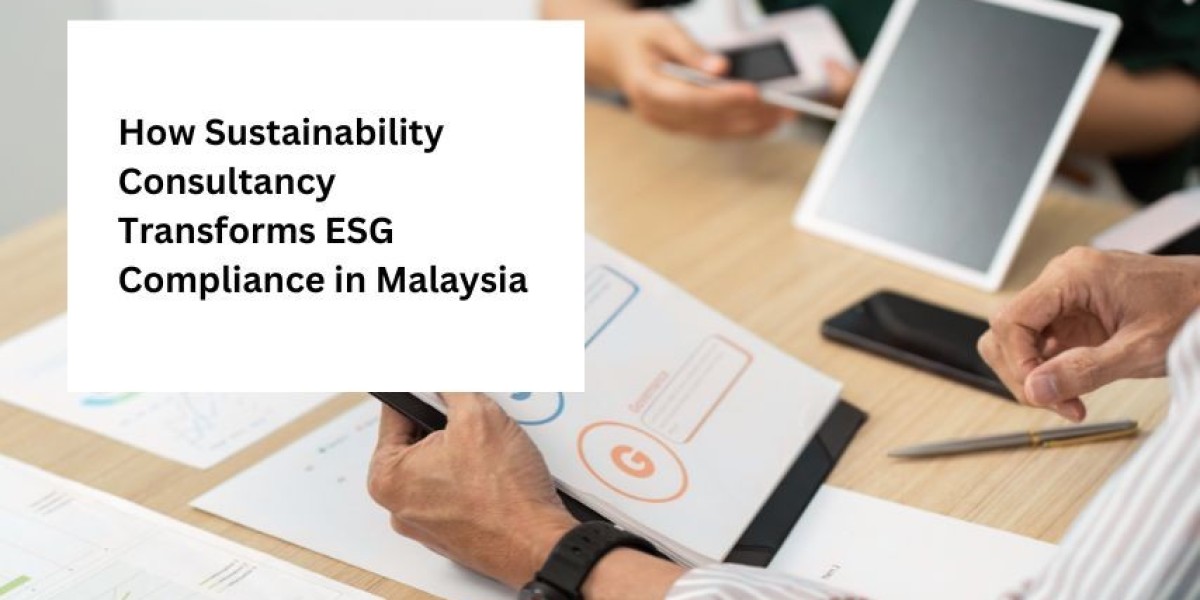Malaysia stands at a pivotal moment where business success increasingly depends on environmental responsibility, social impact, and strong governance. As global investors and consumers demand greater accountability, Malaysian industries are discovering that Environmental, Social, and Governance (ESG) compliance isn't just about meeting regulations—it's about securing their competitive future.
This comprehensive guide explores how sustainability consultancy services are revolutionizing the way Malaysian businesses approach ESG compliance, transforming regulatory challenges into strategic opportunities for growth and innovation.
Understanding ESG Compliance: A Global Movement Takes Root in Malaysia
ESG compliance represents a fundamental shift in how businesses measure success. Rather than focusing solely on financial performance, companies now evaluate their environmental impact, social responsibility, and governance practices as core business metrics.
The global ESG market has experienced explosive growth, with sustainable investing assets reaching $35.3 trillion worldwide in 2020, according to the Global Sustainable Investment Alliance. This represents a 15% increase from 2018, demonstrating that ESG considerations have moved from optional corporate initiatives to essential business requirements.
In Malaysia, this movement has gained significant momentum following the introduction of enhanced sustainability reporting requirements by Bursa Malaysia. Since 2016, publicly listed companies have been required to provide comprehensive sustainability statements, marking a decisive shift toward mandatory ESG disclosure.
The Malaysian government has further reinforced this commitment through various initiatives, including the 12th Malaysia Plan, which emphasizes sustainable development as a key pillar of economic growth. The plan specifically targets a 45% reduction in greenhouse gas emissions intensity by 2030, positioning Malaysia as a regional leader in climate action.
For Malaysian businesses, ESG compliance now represents more than regulatory adherence—it's become a critical factor in accessing capital markets, attracting international investment, and maintaining competitive advantage in an increasingly conscious global marketplace.
Industry-Specific ESG Challenges Facing Malaysian Businesses
Malaysian industries face unique ESG compliance challenges that require specialized understanding of local contexts, regulations, and market dynamics. These challenges vary significantly across sectors, creating complex compliance landscapes that demand expert navigation.
Palm Oil Industry: Balancing Economic Importance with Environmental Responsibility
Malaysia's palm oil sector, which contributes approximately 5% to the nation's GDP, faces intense global scrutiny regarding deforestation, biodiversity loss, and labor practices. The industry must navigate conflicting pressures between maintaining economic viability and meeting stringent sustainability standards set by international buyers and certification bodies like the Roundtable on Sustainable Palm Oil (RSPO).
Companies struggle with implementing zero-deforestation policies while maintaining productivity, establishing transparent supply chain tracking systems, and ensuring fair labor practices across often remote plantation locations. The complexity increases when considering smallholder farmers, who represent 40% of total palm oil area but often lack resources to meet certification requirements independently.
Manufacturing Sector: Energy Transition and Supply Chain Complexity
Malaysian manufacturers face mounting pressure to reduce carbon emissions while maintaining cost competitiveness in global markets. The sector's heavy reliance on fossil fuels for energy needs creates significant challenges in meeting carbon reduction targets without compromising operational efficiency.
Supply chain transparency presents another major hurdle, particularly for electronics manufacturers who must ensure responsible sourcing of conflict minerals and rare earth elements. Companies often manage complex supplier networks spanning multiple countries, making comprehensive ESG monitoring and reporting extremely challenging without sophisticated tracking systems and local expertise.
Financial Services: Risk Assessment and Green Finance Development
Banks and financial institutions in Malaysia must integrate climate risk assessments into their lending and investment decisions while developing green finance products to meet growing market demand. Many institutions lack the technical expertise to properly evaluate environmental risks associated with their portfolios or to develop credible green bonds and sustainable investment products.
The challenge intensifies when considering the need to support SMEs in their sustainability transitions while maintaining prudent risk management practices. Financial institutions must balance their role as enablers of economic development with their responsibilities as stewards of sustainable finance.
Construction and Real Estate: Building Standards and Urban Development
Malaysia's rapidly developing construction sector faces increasing demands for green building certifications, energy-efficient designs, and sustainable material sourcing. The industry must navigate complex certification processes like Green Building Index (GBI) while managing cost pressures and tight project timelines.
Urban development projects additionally require comprehensive environmental impact assessments, community engagement processes, and long-term sustainability planning that many developers find challenging to implement without specialized guidance.
The Strategic Role of Sustainability Consultancy in ESG Transformation
Top sustainability consultancy firms like Wellkinetics have emerged as essential partners for Malaysian businesses navigating the complex ESG landscape. These specialized service providers offer the expertise, tools, and strategic guidance necessary to transform ESG compliance from a burden into a competitive advantage.
ESG Reporting and Data Management
Professional sustainability consultants help businesses establish robust ESG data collection and reporting systems that meet both local regulatory requirements and international standards. This includes implementing software solutions for tracking environmental metrics, developing standardized reporting templates, and ensuring data accuracy and completeness.
Consultants guide companies through the selection and application of appropriate reporting frameworks, such as the Global Reporting Initiative (GRI), Sustainability Accounting Standards Board (SASB), or Task Force on Climate-related Financial Disclosures (TCFD). They ensure that reporting efforts align with industry-specific requirements while maintaining consistency with global best practices.
The expertise proves particularly valuable in helping companies identify material ESG issues specific to their operations and stakeholder expectations. Rather than attempting to address every possible sustainability metric, businesses learn to focus resources on the most impactful areas for their industry and context.
Strategic ESG Planning and Goal Setting
Sustainability consultants work with businesses to develop comprehensive ESG strategies that align with corporate objectives and stakeholder expectations. This involves conducting materiality assessments to identify the most significant ESG risks and opportunities, setting science-based targets for environmental performance, and establishing clear governance structures for sustainability oversight.
The strategic planning process includes competitive benchmarking to understand industry standards and best practices, scenario planning to assess future risks and opportunities, and stakeholder mapping to ensure comprehensive engagement with relevant parties. Consultants help companies establish realistic timelines and milestones while ensuring that ESG initiatives integrate seamlessly with broader business strategies.
Stakeholder Engagement and Communication
Effective stakeholder engagement requires specialized skills in communication, facilitation, and relationship management that many businesses lack internally. Sustainability consultants provide expertise in designing and implementing stakeholder engagement processes that build trust, gather meaningful input, and demonstrate genuine commitment to sustainable practices.
This includes developing stakeholder communication strategies that effectively convey ESG progress and challenges, managing multi-stakeholder initiatives that bring together diverse groups around common sustainability goals, and facilitating difficult conversations about environmental and social impacts.
Consultants also help businesses navigate the complex landscape of sustainability-related partnerships, from industry associations to NGO collaborations, ensuring that engagement efforts produce meaningful outcomes rather than superficial public relations activities.
Technology Implementation and Capacity Building
Many Malaysian businesses require significant technology upgrades and staff training to effectively manage ESG compliance. Sustainability consultants provide guidance on selecting and implementing appropriate technology solutions, from carbon accounting software to supply chain tracking systems.
The capacity building component involves training internal teams on ESG principles, reporting requirements, and best practices. Consultants design customized training programs that build long-term internal capabilities while ensuring that companies can maintain and improve their ESG performance independently over time.
Future Outlook: The Evolving Landscape of Sustainability Consultancy in Malaysia
The sustainability consultancy sector in Malaysia is poised for significant expansion as ESG requirements become more stringent and comprehensive. Several key trends are shaping the future development of this critical industry.
Regulatory Evolution and Enhanced Requirements
Malaysian regulators are expected to strengthen ESG disclosure requirements and expand mandatory reporting to include smaller companies and additional sectors. Bursa Malaysia has already announced plans to enhance climate-related disclosure requirements, following global trends toward mandatory climate reporting.
This regulatory evolution will create increased demand for specialized consultancy services that can help businesses navigate complex compliance requirements while maintaining operational efficiency. Consultants will need to stay current with rapidly evolving regulatory frameworks and provide guidance that anticipates future requirements rather than simply meeting current standards.
Technology Integration and Digital Solutions
The integration of advanced technologies like artificial intelligence, blockchain, and satellite monitoring is transforming how businesses manage ESG compliance. Sustainability consultants are increasingly incorporating these technologies into their service offerings, providing clients with more sophisticated monitoring, reporting, and verification capabilities.
Digital transformation in sustainability consultancy will enable real-time ESG performance monitoring, automated reporting processes, and predictive analytics that help businesses anticipate and mitigate sustainability risks. This technological evolution will make ESG compliance more efficient and effective while reducing costs for businesses.
Industry Specialization and Deep Expertise
As ESG requirements become more sophisticated, sustainability consultants are developing deeper industry-specific expertise to address unique sector challenges. This specialization enables more targeted and effective solutions that consider the specific operational, regulatory, and market contexts of different industries.
The trend toward specialization will likely accelerate, with consultants developing highly focused expertise in areas like sustainable finance, supply chain traceability, carbon accounting, and stakeholder engagement. This specialization will enable more effective solutions and better outcomes for businesses seeking ESG compliance.
Regional Integration and Cross-Border Expertise
ASEAN's growing focus on sustainable development and regional economic integration is creating opportunities for sustainability consultants who can navigate cross-border ESG requirements and facilitate regional sustainability initiatives.
Malaysian sustainability consultants are well-positioned to serve as regional hubs for ASEAN ESG compliance, leveraging their understanding of local contexts while applying international best practices. This regional integration will create new opportunities for consultancy firms while helping Malaysian businesses access regional markets and investment opportunities.
Outcome-Based Services and Performance Guarantees
The sustainability consultancy industry is evolving toward outcome-based service models that tie consultant compensation to actual ESG performance improvements rather than simply advisory services. This shift toward results-oriented partnerships creates stronger alignment between consultants and clients while providing greater accountability for achieving sustainability goals.
Performance-based consultancy models will likely become more prevalent, with consultants taking greater responsibility for ensuring that their recommendations produce measurable improvements in ESG performance and business outcomes.
Conclusion
Malaysia's journey toward comprehensive ESG compliance represents both a significant challenge and an unprecedented opportunity for business transformation. The complexity of modern sustainability requirements demands specialized expertise that most businesses cannot develop internally, making professional sustainability consultancy an essential investment rather than an optional service.
As Malaysia continues to strengthen its position as a regional sustainability leader, businesses that proactively embrace ESG compliance through expert consultancy partnerships will be best positioned to thrive in the evolving global economy. The investment in professional sustainability guidance pays dividends not only in compliance and risk management but in operational efficiency, market differentiation, and long-term resilience.
The future belongs to businesses that understand sustainability as a strategic imperative rather than a compliance exercise. Sustainability consultancy provides the expertise, tools, and strategic guidance necessary to make this transformation successful, enabling Malaysian businesses to contribute to national sustainability goals while securing their competitive futures in an increasingly conscious global marketplace.







